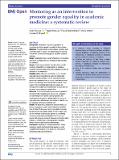Files in this item
Mentoring as an intervention to promote gender equality in academic medicine : a systematic review
Item metadata
| dc.contributor.author | House, Allan | |
| dc.contributor.author | Dracup, Naila | |
| dc.contributor.author | Burkinshaw, Paula | |
| dc.contributor.author | Ward, Vicky | |
| dc.contributor.author | Bryant, Louise D | |
| dc.date.accessioned | 2021-02-10T10:30:27Z | |
| dc.date.available | 2021-02-10T10:30:27Z | |
| dc.date.issued | 2021-01-26 | |
| dc.identifier | 272794749 | |
| dc.identifier | 13e1c803-6163-4141-8289-1501fdefafee | |
| dc.identifier | 85100409079 | |
| dc.identifier | 000614460700028 | |
| dc.identifier.citation | House , A , Dracup , N , Burkinshaw , P , Ward , V & Bryant , L D 2021 , ' Mentoring as an intervention to promote gender equality in academic medicine : a systematic review ' , BMJ Open , vol. 11 , no. 1 , e040355 . https://doi.org/10.1136/bmjopen-2020-040355 | en |
| dc.identifier.issn | 2044-6055 | |
| dc.identifier.other | Jisc: 96da3557c9814d96b71f61c567ffed98 | |
| dc.identifier.other | publisher-id: bmjopen-2020-040355 | |
| dc.identifier.other | ORCID: /0000-0001-8684-0403/work/88731449 | |
| dc.identifier.uri | https://hdl.handle.net/10023/21401 | |
| dc.description | This research was funded by the Faculty of Medicine and Health, University of Leeds award/grant number is not applicable. | en |
| dc.description.abstract | Background : Mentoring is frequently suggested as an intervention to address gender inequalities in the workplace. Objectives : To systematically review evidence published since a definitive review in 2006 on the effectiveness of mentoring interventions aimed at achieving gender equality in academic medicine. Design : Systematic Review, using the Template for Intervention Description and Replication as a template for data extraction and synthesis. Sample : Studies were included if they described a specific mentoring intervention in a medical school or analogous academic healthcare organisation and included results from an evaluation of the intervention. Eligibility criteria : Mentoring was defined as (1) a formally organised intervention entailing a supportive relationship between a mentor, defined as a more senior/experienced person and a mentee defined as a more junior/inexperienced person; (2) mentoring intervention involved academic career support (3) the mentoring relationship was outside line management or supervision of performance and was defined by contact over an extended period of time. Outcomes : The impact of mentoring was usually reported at the level of individual participants, for example, satisfaction and well-being or self-reported career progression. We sought evidence of impact on gender equality via reports of organisation-level effectiveness, of promotion or retention, pay and academic performance of female staff. Results : We identified 32 publications: 8 review articles, 20 primary observational studies and 4 randomised controlled trials. A further 19 discussed mentoring in relation to gender but did not meet our eligibility criteria. The terminology used, and the structures and processes reported as constituting mentoring, varied greatly. We identified that mentoring is popular with many who receive it; however, we found no robust evidence of effectiveness in reducing gender inequalities. Primary research used weak evaluation designs. Conclusions : Mentoring is a complex intervention. Future evaluations should adopt standardised approaches used in applied health research to the design and evaluation of effectiveness and cost-effectiveness. | |
| dc.format.extent | 11 | |
| dc.format.extent | 397593 | |
| dc.language.iso | eng | |
| dc.relation.ispartof | BMJ Open | en |
| dc.subject | H Social Sciences | en |
| dc.subject | R Medicine | en |
| dc.subject | HD28 Management. Industrial Management | en |
| dc.subject | 3rd-DAS | en |
| dc.subject | SDG 5 - Gender Equality | en |
| dc.subject.lcc | H | en |
| dc.subject.lcc | R | en |
| dc.subject.lcc | HD28 | en |
| dc.title | Mentoring as an intervention to promote gender equality in academic medicine : a systematic review | en |
| dc.type | Journal article | en |
| dc.contributor.institution | University of St Andrews. School of Management | en |
| dc.identifier.doi | https://doi.org/10.1136/bmjopen-2020-040355 | |
| dc.description.status | Peer reviewed | en |
This item appears in the following Collection(s)
Items in the St Andrews Research Repository are protected by copyright, with all rights reserved, unless otherwise indicated.

